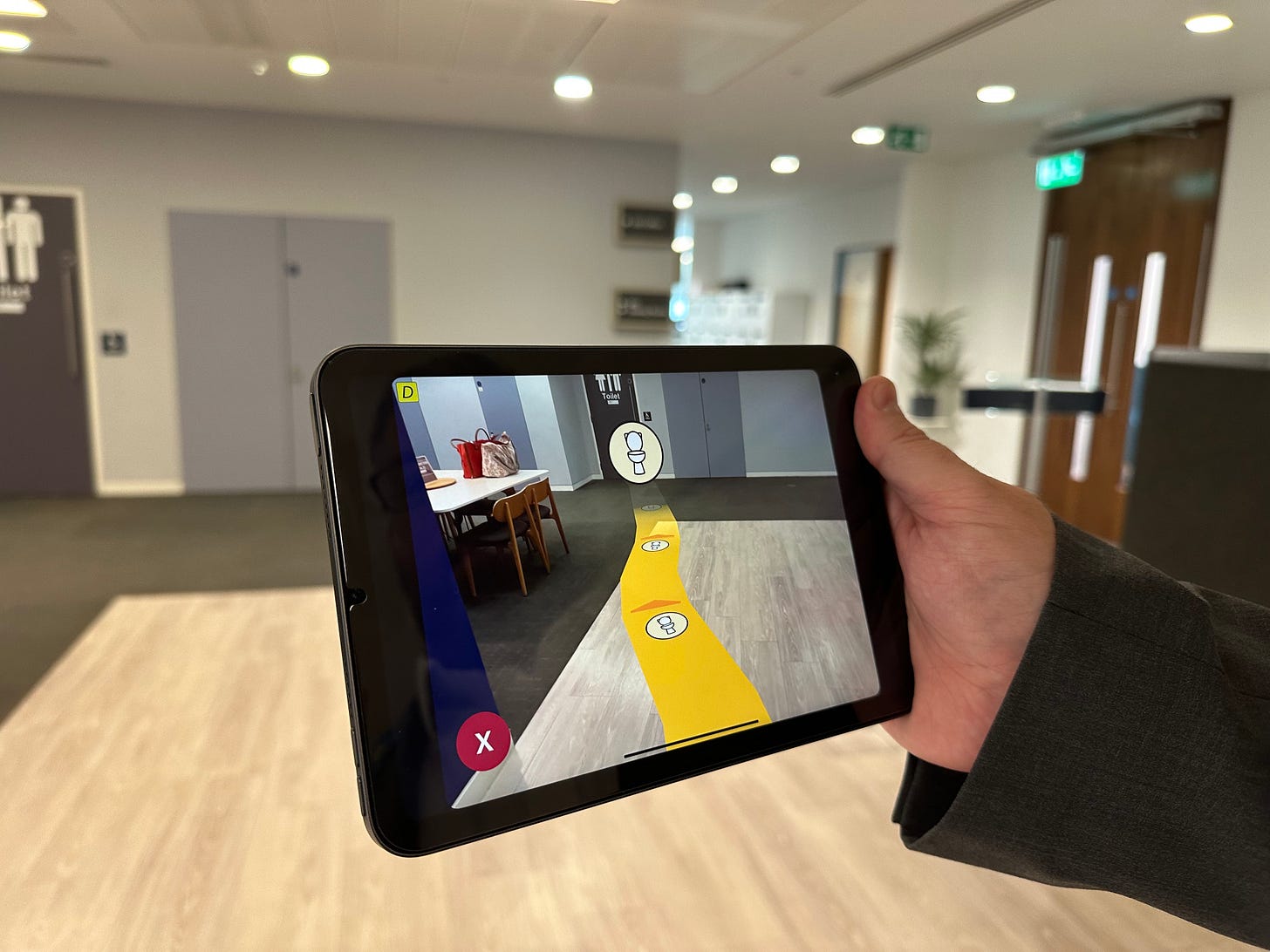A few days ago I found myself following a yellow brick road around the offices of the Alzheimer’s Society in the heart of the City of London. Not a real one, you understand, this was an augmented reality app called Dorothy guiding me to the kitchen or the toilets once I had tapped on a symbol on a tablet computer.
Dorothy is one of the 24 semi-finalists unveiled today in the race for the £4m Longitude Prize on Dementia. They will each be awarded £80,000 to develop their ideas further and then five finalists will battle for the prize which will go to the entry judged to do most to improve the lives of people living with dementia.
The Dorothy app has quite complex origins - it is the brainchild of a Belorussian engineer living in Germany who teamed up with a London clinician, but is being developed by Care City, a non-profit innovation centre which focuses on the health of elderly people.
Ben Williams from Care City told me how the indoor navigation system works: “It uses the camera and motion detectors within a tablet or smartphone to be able to help people to navigate around.” There are two stages - setting up the map, then using it.
Ben and I walked slowly round the corridors of the Alzheimer’s Society building the map, and labelling key locations. Then I tapped on a symbol and used the app to navigate my way to the toilets. The big question is how easy people with dementia will find it to use Dorothy. “We tested it this week with a 93 year old gentleman who hadn't seen it before,” says Ben, “and he found that he could use it within a few seconds.” The Dorothy team plan to use their £80,000 to see whether the app can be useful in locations such as museums.
Among the other semi-finalists are:
iMAGIC - smart glasses with features including facial recognition, helping remind users of the names of people they meet. (Something that sounds like it might make my life easier!)
A.D.A. - a wearable personalised device that tracks daily movements, and can help prevent falls.
AI Interaction Advisor - an interactive voice and text-device that listens to broken speech – a common problem as dementia advances – and speaks aloud the AI’s “repaired” rendition of what the user wanted to say.
DAWN - a lightbulb that uses AI learning patterns to detect deteriorations in behaviour. The bulb can also give reminders to help with daily activities.
Colin Capper of the Alzheimer’s Society, which is funding the prize with Innovate UK, explained to me what they had been looking for from the entries:
”We wanted to see some innovation in technology, we wanted to see a clear articulation of how this would have an impact on people's lives.”
The contest is open to anyone, and entries have come in from around the world - from the UAE, Columbia, Botswana and the USA, from universities, co-operatives or start-up companies. Many feature various forms of AI, with a number of virtual assistants promising to learn about the user and help them to deal with the effects of dementia on their lives.
It struck me that the giant tech companies are pouring huge sums into AI research - so why hadn’t they entered for the Longitude Prize? But Colin Capper told me that a few years ago the Alzheimer’s Society had done some research where it talked to a range of technology and communications companies: “What emerged from that piece of work - surprisingly for me - was that they did not see dementia as a market.”
That seems bizarre given the sheer numbers of people affected by dementia. Perhaps the tech giants think that, as dementia is a progressive disease, there is no point in developing devices for people who, in a few months, may no longer be able to use them. But Capper says the Longitude Prize is all about inventions which will adapt to changing needs:
“It's the idea of being able to compensate for cognitive loss as it happens which is the really exciting potential in this kind of prize. So we've got a number of teams who are thinking about how they create assistants, which are able to, if not predict, then adjust and provide support to people in different ways when their cognitive or functional abilities change.”
Only one idea will win the £1 million first prize but the hope is that the whole four year process and the £3 million in seed funding and development grants going to the 24 semi-finalists will create a dementia innovation network. Perhaps that will persuade the tech giants that there really is a market in improving the lives of the millions of people living with dementia.




I am not surprised that the AI tech giants are not interested in those with dementia. It is the age old problem, excuse the pun. But I would argue that prevention of deterioration is a major point that could deliver for them financially, as you point out the benefits don’t just relate to dementia. It’s a shame to see that people still see dementia in a silo. It affects so many of us not just directly but indirectly as well. Plus it is a way to test technology for wider uses